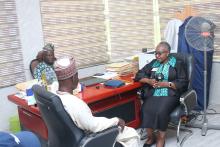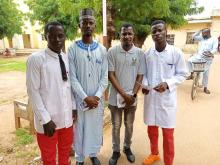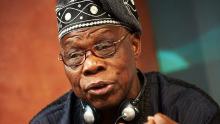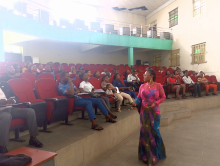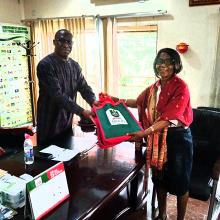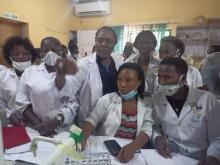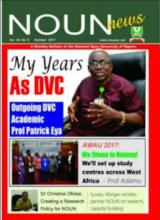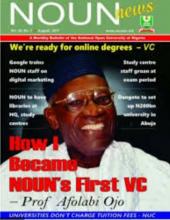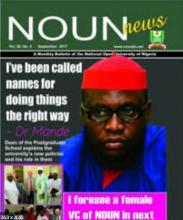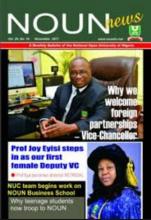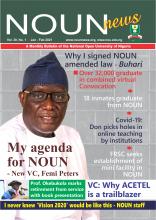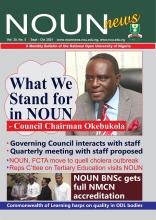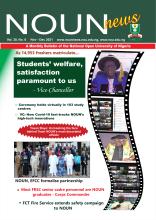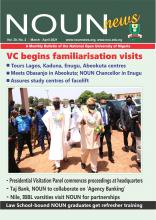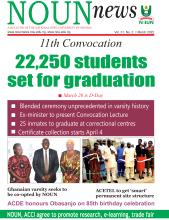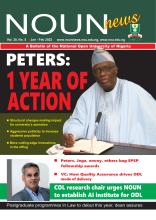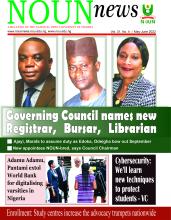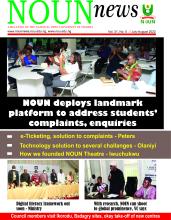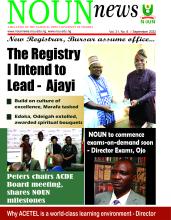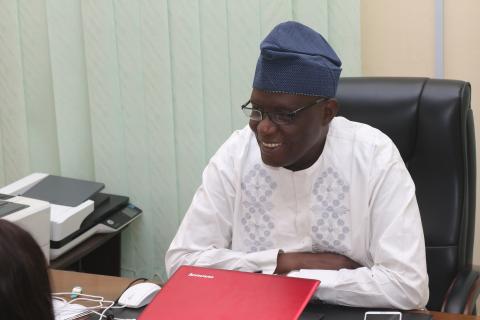
Professor Femi Peters was a household name at the National Open University of Nigeria even before he was elected the new Vice-Chancellor. A Professor of Chemistry, he is a man of firsts at the university - First Dean of the Faculty of Sciences, First Director of Academic Planning, First Director of Examinations and Assessment, and First Deputy Vice-Chancellor Academics.
The new Vice-Chancellor, who assumed office on Thursday, February 11, 2021, in this exclusive interview with NOUN News correspondents Debbie Nduba and Ibrahim Kabiru Sule, unfolds his ambitious and pragmatic agenda to move forward the university from where his predecessor, Professor Abdalla Uba Adamu, stopped. Excerpts:
NOUN NEWS: What are your plans for the university in the next five years?
FEMI PETERS: It is my prayer that I will be able to consolidate on the achievements made by the immediate-past Vice-Chancellor, Professor Abdalla Uba Adamu, who has bequeathed us with certain unimaginable legacies that will project the university positively; it is to continue from where he stopped, either in terms of policies or in terms of programmes and to improve on where we found one or two things that needed to be done.
For instance, I will hope that with time, we will be able to build up our student population to quite a large sum, so as to be able to assume the name of a mega-university that we are. Right now, we are almost in all the nooks and crannies of the country in terms of physical presence. We also want to be there in terms of numbers, we want to be there in terms of presence, and we want the Nigerian citizenry to be very happy to enrol or to partake in what the National Open University of Nigeria (NOUN) is.
The openness is a wonderful thing, meaning that come as you are, and we will take you through our processes and we will make you what you want or what you wish yourself to be. That is the whole essence of openness and we introduce mechanisms that will assist you, processes and procedures that will assist the students or our learners, all those who come in contact with us to actualize their dreams. By then, we would have been able to contribute to the development of the human resource in the country.
NN: It is a culture now to see elected leaders make certain plans or pronouncements on their first one hundred days in office. What are you going to focus on more in the first year in office? What is that worrying thing in your mind that you will like to focus on?
PETERS: Well, the good thing is that we have a Pro-Chancellor, Distinguished Professor Peter Okebukola, who has thrown the gauntlet of his own initiative when he conducted a NEEDS assessment survey and the things he found out were quite outstanding, which really border on students’ satisfaction of their association with the university and also the expectation of the Nigerian community about the university. So, that will be addressed.
Secondly, the issue of our name, "Open University", which suggests that we don’t impact knowledge necessarily using the same mode as University of Ibadan, ABU Zaria or University of Nigeria, Nsukka will; we have to be more serious, be very deliberate and conscious of improving our delivery of knowledge using technology. Again, the academic staff have just been taken through the Moodle Software, virtually. At least, 75% of us now are able to navigate the Moodle, I think, through the training given to us by the Pro-Chancellor.
So, I think what we will need to do now is to build on that and make it more real. Where we need to seek help, we look for help, where we need to develop in-house, we develop in-house. But, certainly, within the next few months, within a year, the flagship programmes, including one or two, say Masters in Business Administration, we need to add MBA to it. The flagship programmes that the immediate-past Vice-Chancellor has already identified, we have to go full blast making them into at least about 75% online delivery model so as to live up to our name and to also lead the Nigerian university system in delivering knowledge using technology.
The third thing I will do is to also exploit one of the legacies Professor Abdalla left behind. It is called ACETEL. We have to exploit, fully, the presence of ACETEL in our university, by developing necessary software protocols that help us understand more science concepts not just for our own undergraduates but be able to pass it onto secondary school at that level. Science subjects are a little bit difficult to understand supposedly because of the abstract nature. So, if we are to have such assistances via the presence of ACETEL in our midst, I think I will really be so happy that I was able to do that in my tenure as the Vice-Chancellor of the university.
The other thing is the welfare of staff. We will try as well to see how we could key-in to those other things that make our staff look at the benefits of other universities and feel that they are having a better edge. But make no mistake, even as at now, the university welfare system is not that bad. We have allowances that other universities don’t give themselves.
The next thing is training. Many staff, both academics and non-academics, don’t really know what ODL is all about; they don’t understand the concept of ODL; they don’t know our relationship with our students; they don’t know what the students expect of us/them. It should have been clear to everybody here that the staff, either academics or non-academics that is in Open University, have different work schedule to those in University of Ibadan or ABU Zaria or UNN. Our schedule is a little bit different. Of course, the main one is that the students are not even here, so we can’t compare ourselves with them, per say. The training has to be able to delineate and be able to assign specific roles so that we will appreciate who we are; and our roles within the system have to be really appreciated.
I was lucky, extremely lucky, that when I joined the university, I had a wonderful training about Open and Distance Learning. In those days when you were sent out, when you went visiting other Open Universities, when you came back, you would come and tell the university community what you saw there. That was the way we were trained. You would go and come back and tell us, "This place I went, this is how they do this and that, this is how they supply the course materials, this is how they write course materials, this is the problem they have."
We are complaining we do two exams, the Open University of Tanzania does four exams in a year. How do they do it? This should be our enquiry. It’s partly because we really have not truly appreciated ourselves. So, the training of staff, both academics and non-academics, we really need to improve on it. But above all we must increase our student enrolment to assume the role or position the government has meant for us.
In countries where we have Open Universities, the student population is easily the largest, so we cannot be different. That means we have to satisfy the needs of our students. In this particular case of ours, our students are our own PR, because they are living in the community or town, as it were. You have the issue of town and gown, which is the university and town which is the community. Our students are in the community, so if I have a brother who is a student of National Open University and he comes home to say that place is useless, they are ‘yeye’ people or he sends text to his friend, that friend will not come to National Open University. There is no newspaper advert or PR that you do, the person will be like "shebi Amina or Emeka said this"! So, we have to meet the expectations of the students, because they will be the ones that will sell the university. If they are happy, they will tell their friends; if they are not happy, they will also tell their friends. So, those are the challenges we have to meet in terms of students’ satisfaction.
Like I said, I want to reiterate, the NEEDS assessment compiled together by the Pro-Chancellor is a masterpiece and we will try and build on it.
NN: The name Femi Peters is a name so dear to people’s hearts, NOUN specifically. What is your transformation agenda to move the university forward once you assumed office?
PETERS: I don’t have a term "transformation agenda". I am continuing where the immediate-past Vice Chancellor stopped. Any challenges we meet along the way, we solve. If there are new things for us to do, we discuss them; if it is worth our while, we implement it. I really don’t have transformation agenda. The four issues as I earlier I told you are what we will tackle, which really is a continuation of what my predecessor did, to build on it, to expand it, make it more effective and efficient. That is really what my plan is.
"I don’t have a term "transformation agenda". I am continuing where the immediate-past Vice Chancellor stopped".
NN: Let us track back a little to what you have just said about being online. In view of the ongoing COVID-19 challenge, most educational institutions in the country are turning attention to online education. How do you plan to see NOUN continue on its leading role in that direction, as other institutions are coming up and looking towards that aspect now?
PETERS: Well, first thing that should be said, and I wish you went through my Inaugural Lecture, there is a place in the lecture where I said the fact that people are doing online delivery is not equivalent to ODL practice. I made that statement and I threw that challenge not because you are able to talk through the television or radio that makes you an ODL, all what you have done, you have exploited the use of technology. ODL has more fundamental issues than that.
Example, one of the concepts of ODL is that no student must be left unattended to; wherever he is or she is, you must meet their needs. So, even as you say that it is online, there are students of Open University who don’t have access to electricity, what will you say? Will you say because they don’t have electricity, they won’t be your students? You must still take education to them. That is why you have various media of delivery so the students could use any form or mix of delivery mode they find most suitable, be it by hard copy, audio, CD or online delivery. But we shall go full blast to make sure we improve our online delivery, but we will do it in such a way that all the philosophies that underpin Open and Distance Learning are met. Thank God for the timeliness of SQADT I trainings. We thank the Pro-Chancellor for that. There will be support for the students because ODL essentially means that you are transferring the teaching to the students, that is why it is called self-learning. That the impetus to study is no longer with the teacher, but with the student, and what do you do, you encourage, motivate the students to read and that is what we call learner support. So, we have to make sure we do that.
NN: Being a man of firsts, how do you now feel becoming the fifth Vice-Chancellor of this great institution, thereby stepping into your predecessors’ shoes?
PETERS: Well, I just feel privileged. I feel honoured. Don’t forget that I vied for the post of Vice-Chancellor ten years ago and was not successful. But even this one was just by the grace of Almighty God. If it was by performance, by connections and what have you, I would not have got it. But it was just by the special grace of God. That is why I am so appreciative, and I feel honoured that I am the VC because looking at the whole process of selection and I was just lucky, just lucky, I didn’t know any person in the Council that I could say, "Yes, this is my person". It was just the grace of God. Just luck.
Therefore, I still want to thank the Council Chairman and the entire Council Members for being very magnanimous and for being considerate to elect me as the Vice-Chancellor; under the chairmanship of Distinguished Professor Peter Okebukola. I am greatly honoured.
NN: Another question, sir, even though you have touched this aspect a bit previously, is that members of staff will like to know your plans in the area of welfare.
PETERS: On staff welfare, I have delved into this before now. Even the welfare you are enjoying now, I was privileged to be one of the actors that enabled its proposal once we got the nod of the then Vice-Chancellor before we took it to Council for approval. And it was just quite right we did that because at that time the slogan used to be "ODL is 24/7", that was what we used to call ourselves. That Open University is a 24/7 work, you’re on the road they call you, you are sleeping, they wake you up, in the morning before you brush your mouth. So, we thought on how best to motivate people for this. That was how the idea of those allowances came from.
What we will further do, I think, is to see how our staff can benefit from those other allowances as are earnable by other universities in the federal structure.
NN: Sir, on a lighter note, how does the man Femi Peters unwind outside the confines of his office?
PETERS (laughs): In Lagos, where I used to live, I belong to Ikoyi Club. I do slight aerobics. I also do play some sports for relaxation. This include squash, although age is telling me on this one to relax. I also play badminton. I read a lot and I watch football very well. That is the way I unwind. I like to travel; I am a traveller. I have been to all parts of this country for holidays. There is no other way of being more civil and enlightened than when you travel to other places outside your immediate domain.
- Log in to post comments
- 552 views

